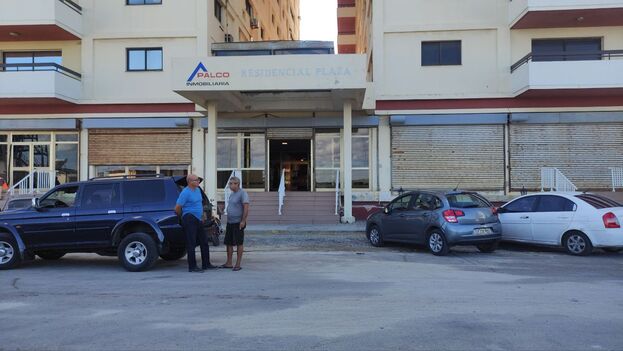
![]() 14ymedio, Madrid, 4 October 2022 — Josu Abrisketa has been in Havana for 28 years, where in addition to being a husband, father and grandfather, he is president of the Ugao Group, a conglomerate of companies that provides varied services that include rum, boilers, footwear and rail services. In Spain he is best known for his membership in the terrorist organization ETA, and these days his name has returned to the fore for his friendship with the ETA leader Mikel Albisu, alias Mikel Antza, who on Monday was called to testify in Madrid in relation to an accusation of an attack in 2002.
14ymedio, Madrid, 4 October 2022 — Josu Abrisketa has been in Havana for 28 years, where in addition to being a husband, father and grandfather, he is president of the Ugao Group, a conglomerate of companies that provides varied services that include rum, boilers, footwear and rail services. In Spain he is best known for his membership in the terrorist organization ETA, and these days his name has returned to the fore for his friendship with the ETA leader Mikel Albisu, alias Mikel Antza, who on Monday was called to testify in Madrid in relation to an accusation of an attack in 2002.
Antza was accused in July, along with five other former ETA leaders, of the attack on a Civil Guard barracks — which left two dead, including a six-year-old girl — in order to prevent the expiration of the time allowed for prosecution (20 years).
This Monday he went to a hearing at the National Court (AN), (empowered in cases of terrorism) to decide on his imprisonment, as demanded by the accusation; the measure was denied, although it was subject to precautionary measures, one of them being the prohibition to leave Spain.
One of the associations that have taken part in the case, Dignity and Justice, provided an expert report to the AN in which it warned of the possible risk of Antza’s escape by taking advantage of his friendship with Abrisketa. The report, to which the Spanish digital news source The Objective has had access, maintains that the former ETA member living in Havana could “be giving him financial support” through his companies. The expert considers that Ugao is part of the financial and business structures created by the terrorist organization in Latin America to facilitate “the social and economic integration of those terrorists fleeing from Spanish Justice.”
“Mikel Albisu Iriarte maintains a strong existing relationship with the Basque businessman D. Josu Abrisketa Korta, owner of the Ugao S.A. Group. This group has its base of operations on the Island of Cuba and remains very active in the promotion of the independence and culture of the Basque Country,” says the author of the document.
To substantiate his opinion, the expert relies on a final ruling in 2007 in which several people who were part of the business network that supported the military were convicted, including the fugitives and refugees in Latin America. Ugao was among the companies indirectly controlled by ETA through an intermediary (the Socialist Abertzale Coordinator, KAS).
In Cuba, according to the report, “monthly salaries of $1,000 were paid to those responsible for the terrorist organization at the head of the companies, and business infrastructure expenses were financed from the KAS common fund.” Although the author of the document admits that the ETA now lacks a military structure, he believes that the support network continues to work perfectly to accommodate one of its former leaders.
The judge of the AN handling the case rejected Dignity and Justice’s petition and determined that there is no real risk of escape, but he did agree to the Prosecutor’s request to impose precautionary measures on Antza, including the obligation to appear every month in court and the prohibition on leaving Spain, in addition to the designation of a domicile for notifications.
Ugao’s offices are in Havana, where Abrisketa was established in mid-1984. The former member of ETA was one of the 16 convicted in 1970 in the so-called Burgos Trial, a case that transcended borders in which 16 ETA members accused of killing three people were sentenced to death during a very close trial by the Francoist courts. The sentences were commuted to long prison sentences (62 years in the case of Abrisketa) after an intense campaign inside and outside Spain, and the defendants benefited from the 1977 Amnesty Law during the transition to democracy.
Most of the defendants became involved in politics or trade union movements after their release, but some remained close to the ETA. In the specific case of the businessman living in Cuba, the return was total, and he entered the military apparatus of the terrorist organization again, this time from the French territory that the Basque independence movement considers its own. There he was arrested in 1983 by the French police, who deported him to Panama months later.
As he himself said in several interviews, Havana welcomed him four months later on the condition that it was voluntarily. “The experience in Cuba has been very good; they treated us and continue treating us like revolutionaries” he says. Now, he warns: “When conditions are right, I’m going to return.”
Translated by Regina Anavy
____________
COLLABORATE WITH OUR WORK: The 14ymedio team is committed to practicing serious journalism that reflects Cuba’s reality in all its depth. Thank you for joining us on this long journey. We invite you to continue supporting us by becoming a member of 14ymedio now. Together we can continue transforming journalism in Cuba.
